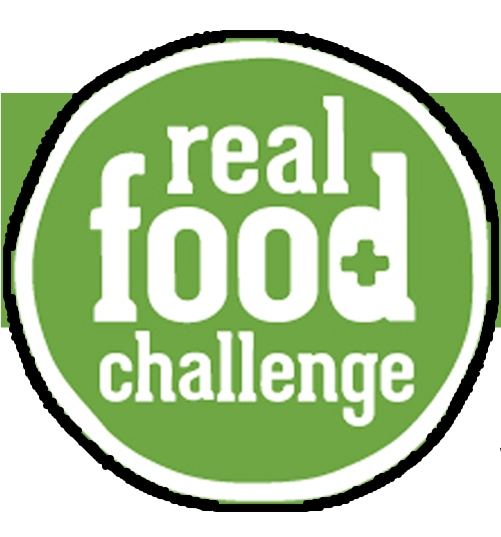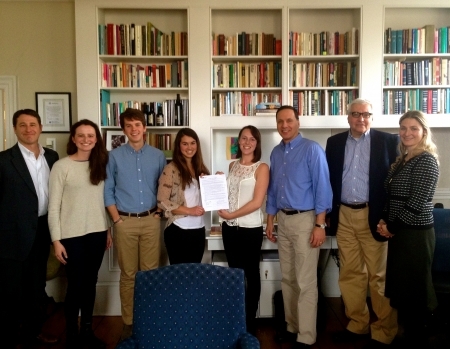Middlebury Signs on to ‘Real Food’ Challenge

MIDDLEBURY, Vt. — Middlebury reaffirmed its longstanding commitment to sustainable dining when President Ron Liebowitz signed on to the national Real Food Challenge (RFC) on December 2. Joining nearly 60 other institutions in the RFC’s campus commitment, Middlebury pledged that by 2016, 30 percent of food purchased for Dining Services will meet RFC criteria, including local (within 150 miles), ecologically sound, fair working conditions, and humane animal treatment.
RFC is a national campaign to shift $1 billion of existing college and university food budgets away from industrial farms and junk food toward healthy, community-based food sources by 2020. RFC provides the schools with a Real Food calculator for tracking purchasing over time. According to students’ economic research and modeling, it will cost the College approximately $70,000 to increase the amount of Real Food in the dining halls from its current level to 30%.
The RFC agreement is the result of a lengthy collaboration among several campus groups, including the student organization EatReal Middlebury, Dining Services, the Office of Sustainability Integration, Environmental Council, and the Student Government Association.

As an early adopter of sustainable dining practices Middlebury Dining Services works with more than 50 local vendors, buys fresh vegetables from the College’s student-supported farm in the summer, and composts practically all of its food waste. Natalie Valentin ’15, who serves on the Environmental Council’s real food subcommittee, believes the Real Food Challenge will build on that success by encouraging students to think holistically about their food system.
“The focus on ‘Real’ has a lot of potential to engage students who may not otherwise be interested in food,” said Valentin. “Middlebury has a lot of students who are really interested in immigration and workers rights, for example. The ‘fair’ category addresses those same concerns. I see a lot of room for collaboration between students involved in the Real Food Challenge and student groups like Juntos, which fights for human rights and fair wages for migrant workers in the Vermont dairy industry.”
Students began organizing around the Real Food idea in 2012. They gathered data from fellow students and found campuswide support for their work to create a more sustainable food system. They also started discussions with Dining Services and received a grant from the Environmental Council to fund the first Real Food internships in 2014. During these internships, students tracked and recorded three months worth of purchasing receipts to create a baseline measurement of Middlebury’s Real Food, which was about 22 percent. Over the summer the students worked with Dining Services to implement five new food products that qualified as real food, lifting the overall Real Food percentage to 25.
“I think we are really lucky at Middlebury to have our own Dining Services,” said Valentin. “It’s allowed for so much more transparency, communication and flexibility that I just don’t think would have been possible if we instead contracted out the management of our dining halls.”
The students, faculty, and staff who proposed Middlebury’s involvement with RFC have ambitious plans to push even further than the 30 percent goal. They are currently researching the feasibility of a second phase that would increase Middlebury’s commitment to 50 percent by 2020.
For More Information
Real Food Challenge
Office of Sustainability Integration
Middlebury Dining Services

